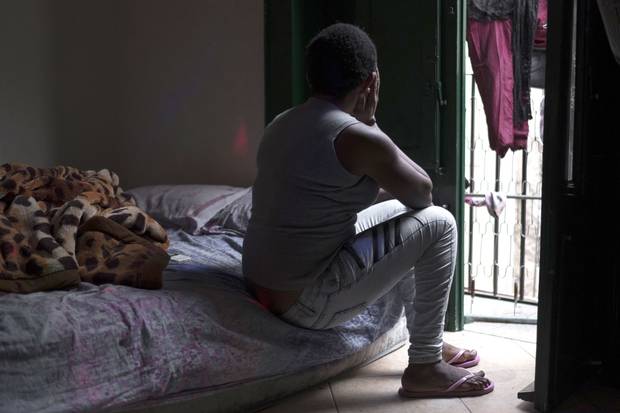Sister Valeria Gandini lowers her head in prayer. The young women, who adore the soft-spoken, 77-year-old Italian nun, do the same. "Our Father, who art in heaven …" they say in unison. The prayer is followed by another. "Hail Mary, full of grace…"
Sister Valeria asks one of them to invent her own prayer. The woman – maybe a teenager, it's hard to tell under the wig and layers of makeup – smiles and, without hesitation, says: "Forgive me, Father, for I know what I am doing to my body is wrong."
We are not in a church. We are on the side of a busy road in La Favorita, the unkempt, 400-hectare park on the northwest fringe of Palermo, the Sicilian capital, that is full of runners and bikers – and dozens of young West African women and teenagers selling their bodies for €20 ($30).
We've arrived here in a beat-up Fiat on a warm, sunny morning in late March. The trunk is filled with stacks of half-litre water bottles, little cakes wrapped in cellophane and soda crackers – small comforts for the women whom Sister Valeria works tirelessly to help. Favorita is a 15-minute drive from central Palermo, and it's immediately apparent why the women choose this part of town to offer sex. The trees and bushes extend to the road. They and their customers need to retreat only a few metres to hide from the traffic.
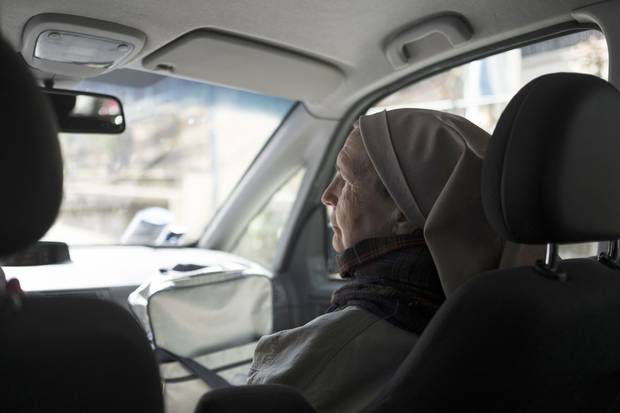
Sister Valeria Gandini makes her rounds to visit women forced into sexual slavery.
When we pull off the road for the first time, no women are visible. But within seconds, three come bounding out from the bushes, all smiles. One of them calls Sister Valeria "Mama." The women wear bright red lipstick, tight skirts or shorts and cheap street wigs. Crosses hang from their necks – they are Christians. They each carry phones, which they often use to check their Facebook pages, presenting normal lives to their friends, at least digitally. "Their Facebook pictures correspond with the notions of Western wealth – you see cars and clothes," says Maggie Neil, 26, an American of Sicilian descent who has joined the ride as part of post-graduate research she's doing on human trafficking. What doesn't get mentioned is how the women are making their money.
Sister Valeria gives them hugs and kisses and hands them the water bottles, cakes and biscuits, which they stuff into their bags after saying "thank you" in English – their Italian is poor. "Who is going to help us today?" Sister Valeria asks. That's her signal for prayers. A Nigerian with a long wig in rainbow colours and whose street name is "Happiness" – they never reveal their real names or ages – leads us all in prayer, a simple Hail Mary this time.
We make three or four other stops, and the format is similar: Affectionate greetings, food and water, prayers and chats. Sister Valeria and Ms. Neil ask if they need help in any way, such as a visit to the doctor. Probing questions about the identity of their bosses, how much money they owe to them or, if they have bruises or cuts, who beat them up are not asked. The goal is to gain the women's friendship and trust, not to act like police interrogators, and offer them a way off the streets – if they summon the courage to choose it.
For most of these women, sex work isn't a choice. It's slave labour, enforced by vicious gang leaders who threaten the women with physical violence and deportation if they refuse to comply. "Treasure," the woman who asks God for forgiveness for selling her body, had a black eye and scars on her arms not long ago, Sister Valeria says. Another woman, Michele, improvises a prayer during one of our stops: "Please God, give us better jobs, give us our documents," she says. Anyone who refers to the women and girls as "prostitutes" gets a piercing look from Sister Valeria. "They are sex slaves," she says. "They are not prostitutes. They are victims of trafficking."
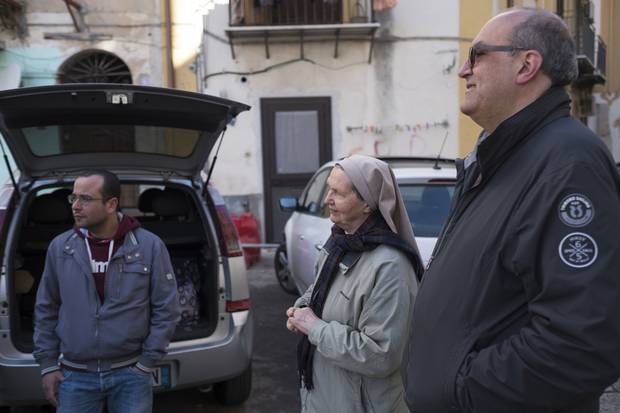
Sister Valeria, middle, and Father Vincenzo (Enzo) Volpe, right, estimate there are 500 Nigerians working against their will on Palermo’s streets and in its brothels.
Most of the women in Palermo are Nigerian. Father Vincenzo (Enzo) Volpe, 48, the Sicilian priest who works with Sister Valeria to protect the women and offer them hope for a new life, estimates there are some 500 Nigerians working against their will on the streets and in the brothels. That's a big number for a city with a population of only 1.3 million.
According to the United Nations, charities and university researchers, tens of thousands of Nigerian sex slaves have poured into Italy and more are arriving almost every day in rickety boats dispatched from the Libyan coast, seeking a better life in Europe. What happens to the women when they arrive is a side of the global migration crisis that's not often reported: a massive human trafficking problem that begins in their home countries plays out on the rough streets of European cities, where the smuggling networks deliver them.
As we drive back to the church, we pass Romanian prostitutes who could also be sex slaves. In Palermo, the darkest side of the migration crisis – trafficked women – is always in plain view. Many have been battered. Over the years, a few have been murdered. The volunteers and religious orders who try to protect the Nigerian women and girls don't talk about a migration or a refugee crisis; they talk about a trafficking crisis.
"The girls are slaves from every point of view – economically, religiously, physically, psychologically," says Tania Macaluso, 32, a University of Palermo graduate who wrote a 118-page thesis on the trafficking of Nigerian women and now works at a charity that gives them medical assistance. "The other tragedy is that the ages of the girls is going down, down, down. Now they're very young. They are fresh meat. The clients prefer young girls."
Some of them are as young as 15, she says. If that were not sad enough, the reality is that most of them are trapped and cannot escape, at least not until the outrageously expensive debts assigned to them by the traffickers are paid off. Sister Valeria and Fr. Enzo have succeeded in helping only a few of them find new lives. But they keep trying.
Piazza XIII Vittime is an ugly square near the port of Palermo that, I am told, attracts lots of Nigerian sex slaves.
When I arrive at about 10 p.m., the place is empty. A few minutes later, a couple of police cars park on the far side of the square, next to a gas station. Suddenly, nine women head toward a park bench on the edge of the square that is largely hidden by bushes. Even though the women are brutally exploited, they do not consider the police their friends for the simple reason that they lack any form of documentation, meaning they could be deported.
I approach one of the women and say I just want to talk. She is hesitant, so I give her €40 and repeat my offer – just talk. Her street name is "Favour." She claims she is from Ghana (though most of the women are from Nigeria) and that she's 25, though she looks 18 and could be younger. She wears a long red wig, ripped fishnet stockings and flat shoes, and shivers in the cool night breeze.
The details of her journey to Palermo, though credible, are impossible to verify. Favour says she left Ghana because she had no money or job prospects. Last October, after hearing Italy was the promised land, she borrowed money to pay for the overland trip to Libya. During the leg from Sabha, the oasis city that is at the heart of the Libyan human smuggling and trafficking network, to Tripoli, she and two other Nigerian women were kidnapped and flung into a warehouse-style structure near the sea. "They only fed us bread and water," she says. "They raped us. We were in a room and couldn't leave."
She says she paid €250 to her captors to secure her freedom, another €800 to buy passage on a rubber boat to the Italian island of Lampedusa. She says she ended up at a migrant centre near Salerno, south of Naples, and wound her way to Palermo, where she has friends. Favour insists she is independent and keeps the cash she earns from having sex with five to 10 men a night, but her claim doesn't entirely add up.
She says she lives in an apartment in Ballarò with other women who work the streets – a sign that she probably has a live-in boss who exploits her. (The Ballarò neighbourhood, a gritty warren of streets in central Palermo, is a delightful food market by day and an illicit drugs supermarket controlled by Nigerian gangs by night.) When I ask why she does not head north to the wealthy cities of Milan or Turin to find a job, she lets slip that she has to pay off some debt first, another sign that she is probably under tight control. "Some girls pay the bosses thousands [of euros] so they can leave," she says.
Favour is almost certainly a trafficking victim. "I'm sad because I don't like my job," she says. When the police cars leave the square, she and some of the other women stroll back to their preferred spots near the gas station. By now, it's 11 p.m. and they won't leave the street for another four or five hours.
When they return to their apartments, they will probably have to hand over most or all of their cash to their Nigerian women bosses, known as mamans. Ms. Macaluso says she befriended a Nigerian woman who once invited her to see where she lived. The outside of each of the bedroom doors had a padlock on it, she says.
The scale of human trafficking globally, and from Africa to Europe, is shockingly high, according to the United Nations anti-slavery officials, human-rights groups and charities that monitor the endless flow of migrants across the Mediterranean.
A website of a global coalition of anti-slavery activists called Stop the Traffik publishes a grim list of slavery statistics. It notes that the Global Slavery Index estimated that, in 2015, almost 36-million people were enslaved and that human trafficking is the world's second biggest source of illicit income, behind drug trafficking. The International Labour Organization put the annual profits from all forms of human trafficking – including sex slavery and farm slavery – at $150-billion (U.S.).
The majority are Africans trying to escape civil wars, political unrest, unstable economies, famine and drought. With the crossing between Turkey and the Greek islands largely shut down, Italy is now attracting most of the migrants. They usually cross from Libya in dangerously overloaded boats that often sink (the UN's International Organization for Migration says 5,098 migrants died in Mediterranean last year).
In 2016, Italy took in more than 180,000 migrants, equivalent to the population of Barrie, Ont., or Kelowna, B.C. For the first time, Nigerians were the largest single group: About 37,500 arrived last year, according to the IOM, fleeing rising poverty and violence. About 11,000 of them were women and 3,000 were unaccompanied children. The number of women rises every year, dramatically so. In 2014, only 1,450 Nigerian women were registered at Italian migrant centres.
Who are these women? The IOM believes that about 80 per cent are trafficking victims destined for the streets and brothels of Europe. "The trafficking [from Nigeria] is especially brutal in nature," Kevin Hyland, Britain's anti-slavery commissioner, said in early March at a UN Security Council debate on modern slavery. "Women [in Nigeria] who insist they will not work as prostitutes are tied up in a position called 'the crocodile,' where their hands are tied to their feet, and they are left for days without food or water. Some are left to die as an example to others."
The Nigerian women mostly come from Benin City, in Edo State, in the economically poor southern part of the country. The city is known for its low-paying rubber and palm-oil industries and, lately, human trafficking on an epic scale.
The women are lured by "recruiters," who are sometimes friends of the family. Their pitch: The promise of a job, however menial, in Italy and of pleasant accommodation and meals. While some women know they will be forced to sell their bodies, many do not. Ms. Macaluso says the parents sometimes encourage their daughters to make the trip, even if they suspect the girls are being trafficked into sex slavery, because they know the girls will wire some of their income back to the family.
Many of the girls who agree to make the journey to Europe are taken to a local "juju" priest or priestess – a sort of witch doctor – who casts a spell on the girls, or so they believe. The juju in essence uses fear to enforce a contract, in this case, the girls' promise to obey their masters in Europe and not leave until their substantial debts to the traffickers and mamans are repaid.
Typically, the juju priest will take head hair, pubic hair or fingernails, even blood, from the girls. He wraps them into a package. "He will say that if you don't behave, we will burn these pieces of you and something bad will happen to you," Fr. Enzo says. "You will burn or a family member will burn."
Their horrific journeys north, across the Sahara to the Libyan coast, begins after the juju ceremony. When they arrive in Palermo or elsewhere in Europe, the debt assigned to the girls for the trip and accommodation in Europe can be €20,000 to €40,000, Ms. Macaluso says. That's a fortune by Edo State standards.
The high amount virtually guarantees servitude for several years. "The more beautiful you are, the more you have to pay back, because the beautiful ones can make more money," she says.
Bound by the juju, the girls keep very little of their sex earnings. They have to pay the mamans for room and board, the debts to the traffickers and the mamans and, often, the local Italian Mafia for the right to occupy a strip of road (the Mafia "tax" is known as the pizzo). The endless payments mean the girls are sometimes trapped into prostitution for years. "There's not much left for the girls," Sister Valeria says. "We know one who worked the streets for five years."
One sex slave was killed, her body burned, in Palermo, in 2011. Nike Adekune, known as "Favour" (the street names used by the women don't vary much), was from Benin City. One of her clients, a 58-year-old Italian man, was convicted of her murder. Her funeral was held in Fr. Enzo's church. Several Nigerian prostitutes, presumably sex slaves, have been murdered elsewhere in Italy in recent years.
Italian police are investigating the sex-slave traffickers and have made some arrests, though relatively few, given the apparent scale of the crime. Early last year, Catalan police in Spain broke a sex-trafficking network run by a criminal Nigerian gang known as the Supreme Eiye Confraternity. The trials resulted in 23 prison sentences.
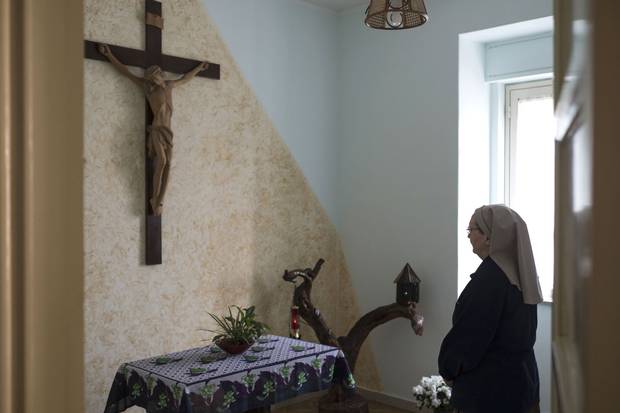
Sister Valeria lives in a simple apartment overlooking Palermo’s Ballarò market. She spent 20 years in Africa as a member of Comboni Missionary Sisters before returning to Italy. She has lived in Palermo since 2009.
Fr. Enzo and Sister Valeria are an odd pair, united by their relentless commitment to helping the sex slaves of Palermo: A towering 6-foot-6, he's the priest-giant of Palermo; she's a small, frail nun almost 30 years older. Fr. Enzo reaches out to the Nigerian women and girls at least one night a week; Sister Valeria does her visits in the morning.
In her simple apartment overlooking Ballarò, the historic Palermo market area alive with the noise and smell of street vendors selling everything from artichokes to mussels, I ask Sister Valeria is she afraid for her safety. She gives me a puzzled look, and I elaborate, suggesting that the Nigerian gangs, like the Black Axe, that evidently control some of the sex slaves or their mamans, might not take kindly to a nun who urges their income earners to quit selling their bodies.
"I don't have fear," she says. Indeed, Palermo, for all its criminal activity, is a safe haven compared to some of the spots she has worked in as a member of Comboni Missionary Sisters, an order founded in the 1800s by Daniele Comboni, an Italian linguist who devoted his life to helping the poor in northern Africa and raising European awareness about their plight (he was canonized by Pope John Paul II in 2003). She spent 20 years in the Comboni missions in Sudan, Ethiopia and Uganda. "Everywhere I went, there was war," she says.
By the time she returned to Verona in 1989, Italian cities were already attracting African migrants and some of what she learned shocked her. "The African women needed help," she says. "I learned about their lives as trafficked prostitutes and I couldn't believe their stories at first. I got to know a 16-year-old Nigerian girl who slept in garbage bins at night to hide from the men."
She has been helping African women in Italy since then, and moved to Palermo in 2009. A lot of her work is done with the local branch of Caritas, the Catholic relief and social services agency. "When I came here, I was told not to go onto the streets with the girls, but I did anyway," she says.
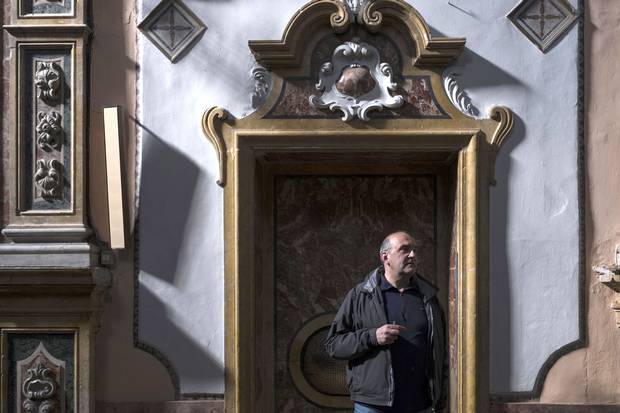
Fr. Volpe, head of Palermo’s Church of Santa Chiara says he has ‘saved’ only four women from sexual slavery during the past five years.
Fr. Enzo took over Santa Chiara five years ago. The 16th-century Sicilian baroque church operates a community centre for needy locals that includes a day care hall for 35 children, many of them children of migrants. The mothers of at least two of the kids are sex slaves.
After the murder of Nike Adekune in 2011, "we decided to start our anti-trafficking effort," Fr. Enzo says. He joined forces with Sister Valeria and Caritas to spread the word to the municipality, to politicians and to the media that the Nigerian women on the street and in the brothels were not prostitutes – a term that implies a woman's willingness to sell sex – but victims of trafficking with no freedoms whatsoever. "These girls are treated like pack animals," he says.
A force of nature, and not just because of his size, Fr. Enzo devotes himself to helping the Nigerian women. (His idea of serving God is never to spend his days kneeling alone in prayer, he says.) Over the years, Fr. Enzo and Sister Valeria have befriended and helped many hundreds of Nigerian women and girls. The ones who are willing to leave are spirited away and placed in safe houses before fleeing Sicily. Ideally, they have jobs, such as hairdressing or cleaning, so they are not tempted to become prostitutes.
Sister Valeria says she has "saved" 12 girls over the years. Fr. Enzo says he has saved only four during his five years. He admits it's not an impressive number, considering the high number of sex slaves in Palermo. "Today, the girls are much more controlled than they used to be and it's hard to get them out," he says. "But I am very happy to do this work, even if there are no immediate results. We have to give these girls hope."
Eric Reguly is The Globe and Mail's European bureau chief.
SEX TRAFFICKING: MORE FROM THE GLOBE AND MAIL
One woman’s journey from forced prostitution to human rights advocacy
